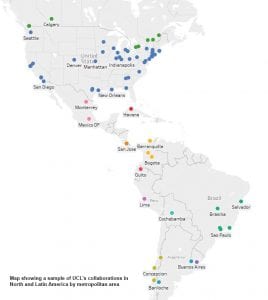Ask GEO: Ciaran Moynihan, Senior Partnership Manager (North and Latin America)
By Sophie Vinter, on 25 January 2017
 Ciaran is GEO’s Senior Partnerships Manager for North and Latin America. Here he shares some key updates and opportunities from both regions with us.
Ciaran is GEO’s Senior Partnerships Manager for North and Latin America. Here he shares some key updates and opportunities from both regions with us.
Tell us more about your role in GEO and activity in your regions
I work closely with UCL faculties and departments, as well as other Professional Services, to manage and develop partnerships with institutions in North and Latin America. As you can imagine, UCL has a very wide range of activity in both regions, ranging from research collaborations and student exchanges to dual degrees and beyond. Some interesting partnerships I work on would be the Yale UCL Collaborative; an emerging priority partnership with Pontificia Universidad Católica de Chile; and another emerging partnership with the University of Toronto (to name but a few!)
One challenge I face in my role is around capturing the full breadth of activity that UCL colleagues have underway with partners in North and Latin America – I am always interested to hear about links in the regions which I may not be aware of – so please do get in touch to tell me about your research and education links in both regions. There may be ways I can support you in your endeavours!
 What are the UCL Research Catalyst Awards?
What are the UCL Research Catalyst Awards?
The UCL Research Catalyst Awards, sponsored by Santander Universities, have successfully run since 2011. The scheme has enabled more than 40 visits to Latin American universities to support development of research collaboration.
The purpose of the awards is to foster research collaboration between UCL and key partner universities in Argentina, Brazil, Chile, Colombia, Mexico and Peru. The awards are available to cover travel, accommodation and subsistence costs associated with focused visits to potential research collaborators, and are aimed at achieving a specific outcome that will support future research collaboration.
We have recently extended the deadline for this year’s applications to Monday 13 February 2017 at 10am. If you’d like to apply, find out more on GEO’s website.
Why do you think UCL’s partnership with Santander Universities is so successful?
UCL began its partnership with Santander Universities in 2007 and was one of the very first UK universities to become a member of the Santander Universities network. The partnership provides UCL students and staff with numerous benefits and opportunities, ranging from study abroad experiences, to research travel grants for staff, to Masters scholarships for incoming students from Latin America.
The partnership with Santander Universities is a strong one for UCL – this year marks the ten-year anniversary of the relationship, which has gone from strength to strength. Not only does Santander Universities provide funding to UCL, but we also work closely with them on support for student entrepreneurship and on helping students to gain internships in small and medium enterprises to enable them to be better prepared for global careers and lives.
UCL will shortly sign a new partnership agreement with Santander Universities, renewing our strong relationship through to 2019, so watch this space for updates on opportunities for staff and students!
What are you working on at the moment?
One of my big areas of focus right now is developing a potentially important partnership with the University of Toronto (U of T). UCL already has strong collaborative links with U of T in a range of areas including child health, education, big data and cancer research, to name a few. We also have a large undergraduate student exchange programme with them. I am currently working with UCL faculties and U of T, under the leadership of the Vice-Provost (International), to explore other areas in which we might collaborate together. Most specifically right now, we are organising a joint workshop on ‘cities’ at UCL, to discuss research collaboration in this area.
U of T is a similar institution to UCL – located in a global city, similarly placed in world league tables, research intensive and with strong educational underpinnings for our students. We are excited at UCL with the opportunity this developing partnership presents, to enable us to work together to deliver excellence in research that will potentially have global impact while also supporting our students as global citizens.
What benefits would joining the North and Latin America networks bring to UCL academics?
Both networks essentially act as ‘communities of interest’ for UCL academics working on topics related to the region, with partners in the region or from the region. We hold termly meetings to bring academics together to hear about institutional initiatives in these regions, while also providing a forum for academics to network with each other and discuss their work regarding partners from North and Latin America.
We also utilise the networks to share regular region-specific funding opportunities that may be of interest to academics, and we are planning to run some academic led events over the coming months. In fact, it would be wonderful to hear from UCL academics on themes, topics etc. for possible events which colleagues would like to see run via the networks!
Contact Ciaran on:
ciaran.moynihan@ucl.ac.uk
+44 (0)20 3108 7777 / internal 57777
 Close
Close



